Vince Foster
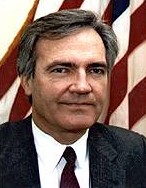 If you're interested in the death of Vince Foster, you're in luck. More has probably been written on the subject than on Watergate, the Kennedy Assassinations and the Moon Landing combined.
If you're interested in the death of Vince Foster, you're in luck. More has probably been written on the subject than on Watergate, the Kennedy Assassinations and the Moon Landing combined.
If you're interested in the life of Vince Foster, well, too bad.
You'd think that a man must have had a really distinguished and important life to be worth so much ink. You'd think that he must have swayed kingdoms, cured cancer, invented a perpetual motion machine or discovered the Holy Grail. But no.
Vince Foster was an Arkansas lawyer, a description which once would have invoked visions of Mayberry and pies, an imputation of a happy, overstuffed, slow-paced life in the sticks as richly and satisfactorily lived as it would be quickly forgotten. But the phrase "Arkansas lawyer" took a sharp turn to the dark side during the 1990s, and Foster was dragged along with it.
Foster was born in Hope, Ark., the same town as Bill Clinton. Bill and Hillary were good friends with Foster, who like Hillary was a partner at the Rose Law Firm in Little Rock. One of a small army of disciples who followed the Clintons from Arkansas to Washington, D.C., in 1992, Foster settled in as deputy White House Counsel, a relatively low-level position in which he frequently interfaced with Hillary Clinton.
 Early in 1993, the first of what would be many Clinton administration scandals broke loose — the so-called Travelgate scandal.
Early in 1993, the first of what would be many Clinton administration scandals broke loose — the so-called Travelgate scandal.
Travelgate can be summed up thusly: A bunch of travel staffers were fired by the White House on the pretext of wrongdoing, at the urging of Clinton crony Harry Thomason. Did they get screwed? Probably, yes. Did they do anything wrong? Debatable, but probably not. Was it a pointy-haired, Dilbertesque act of stupidity? Sure. Was it a Constitutional Crisis? No. Was it a threat to National Security? No. Was it a crime? Ehhhh.
Little knowing what treasures of tabloid journalism the next eight years would hold, the media jumped all over Travelgate, particularly the Wall Street Journal, which ran a scathing editorial about the specific evils of Vince Foster. Foster had been appointed by Hillary Clinton to "take care of" the alleged shenanigans of the Travel Office workers. As deputy White House counsel, he had supervised the "investigation" of the employees and met with the FBI, which had also investigated the workers at the behest of the White House (the FBI found no wrongdoing).
An investigation of the Travel office investigation ensued, and Foster began obsessively taking notes on the affair, in which his concern about protecting Hillary was clear, but any actual wrongdoing in the incident was not. After the Wall Street Journal crucifixion, Foster began a short journey into a deep depression, by every account.
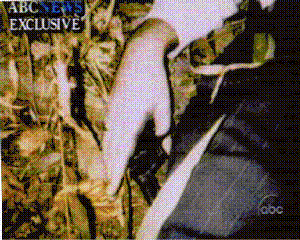 On July 20, 1993, Vincent Foster committed suicide by shooting himself through the back of the head. In a scribbled note, apparently a farewell note, discovered a week after his death, he observed that in Washington, D.C., "ruining people is considered sport."
On July 20, 1993, Vincent Foster committed suicide by shooting himself through the back of the head. In a scribbled note, apparently a farewell note, discovered a week after his death, he observed that in Washington, D.C., "ruining people is considered sport."
The sport wouldn't die with the victim. In death, Vince Foster became something he likely couldn't have possibly imagined in life: A hero and martyr to the Far Right.
Foster had been involved in various Clinton legal matters, including Whitewater, a shady and unprofitable land deal that persisted as a topic of interest among those who found Willie a little too slick. The questions began almost immediately, and were deepened when the White House allegedly tried to restrict access to Foster's files as the investigation into his death began. By January 1994, the Whitewater deal (and a host of semi-related scandals) became the subject of an independent counsel investigation.
The Foster "murder or suicide" investigation revolved around a variety of claims, made by journalists in and out of the mainstream, but mostly out. The claims can generally be divided into two major categories for useful contemplation. Category one is outright lies, category two is gross distortions. First, the lies:
-
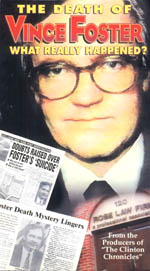 Wounds not consistent with self-inflicted gunshot.
Wounds not consistent with self-inflicted gunshot. -
Not enough blood on the scene given the injuries.
-
Foster's hands lacked gunshot residue consistent with self-inflicted shot.
-
Firing position "inconsistent" with suicide.
-
The body was "neatly arranged" where it lay.
-
Foster's clothing not examined by investigators.
-
Evidence on scene, including patterns of bloodstains, indicated Foster's body had been moved
-
Investigators failed to interview neighbors and area residents after the incident.
-
Crime scene photos missing or otherwise unusual in format.
Then there are the gross distortions:
-
Foster's head moved after death. (His head was moved by rescue workers, consistent with a routine procedural verification that he was, in fact, dead.)
-
Suspicious carpet fibers found on Foster's clothes. (The fibers were tested and determined to have come from Foster's house.)
-
No fingerprints on the gun's trigger. (The gun handle wasn't smooth, but textured, a surface which the FBI stated was unlikely to retain prints.)
-
The body was found in "unusual surroundings" on a steep slope in dense brush. (What is a usual surrounding for a suicide in a park?)
-
Foster's glasses were found 19 feet from head, an "impossible" outcome of the shot. (It was 13 feet from Foster's feet, down slope, and the glasses had blood and gunpowder residue, and forensics experts determined what one would think would be obvious — that the glasses were flung from his head when he fired the gun.)
-
Foster's car keys were not found on his person at the scene. (Foster's pockets were patted down briefly on the scene and the keys were not found. Police went to the morgue a few hours later and turned the pockets out, where they found the keys.)
-
Foster's wife couldn't identify the gun used in the suicide as his, raising doubts that he owned the gun. (Foster owned several guns he had received from his family, including a .38 caliber gun received from his father that matched the gun on the scene. His wife couldn't definitely identify it, but confirmed one of his guns was missing.)
-
Five witnesses claimed Foster had a briefcase in his car, which was omitted from the police report. (Four witnesses said they thought "maybe" they thought they saw a briefcase in the car. A fifth said there was definitely a briefcase and also some wine coolers. No one else saw any wine coolers. Where is the outrage over the wine coolers?)
By now, you're probably saying to yourself, "What kind of goddamn pinko commie liberal conspirator would try to tell us that all these things are lies and distortions?"
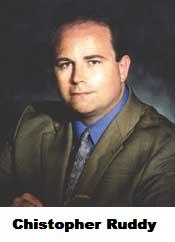 Well, his name is Ken Starr. All of the above points were derived from the report prepared by Independent Counsel Ken Starr during his $39.2 million, four and half year investigation of the Clinton administration's alleged wrongdoings. Starr's investigation of the Foster allegations followed a previous special counsel investigation covering Whitewater and the Foster allegation, at a cost of $6 million, and two separate law enforcement investigations, all of which came to the same conclusion: Vincent Foster committed suicide.
Well, his name is Ken Starr. All of the above points were derived from the report prepared by Independent Counsel Ken Starr during his $39.2 million, four and half year investigation of the Clinton administration's alleged wrongdoings. Starr's investigation of the Foster allegations followed a previous special counsel investigation covering Whitewater and the Foster allegation, at a cost of $6 million, and two separate law enforcement investigations, all of which came to the same conclusion: Vincent Foster committed suicide.
Lest we forget, Starr doggedly pursued every lead that came his way, finally determining to recommend that Congress IMPEACH THE PRESIDENT OF THE UNITED STATES FOR LYING ABOUT BLOW JOBS. If anyone was motivated to nail Clinton to the wall for a shady murder, it was Ken Starr.
Most of the above allegations of foul play in the Foster death originated with Christopher Ruddy, a reporter for a small-town newspaper in Pennsylvania owned by billionaire arch-conservative Richard Mellon Scaife, and the Western Journalism Center, a non-profit institution supporting "independent journalism," which is primarily funded by Scaife.
Some of the charges, including some not listed here, originated with a prosecutor named Miquel Rodriguez, who worked for Starr briefly then resigned, moving on to be the subject of many interviews by Ruddy.
The Foster allegations were further amplified in the infamous video, "The Clinton Chronicles," which portrayed Clinton as a rampaging monster just short of Vlad the Impaler, gleefully trafficking in cocaine and racking up a body count. The video was produced by Jerry Falwell, through an organization called "Citizens for Honest Government," which (according to Salon Magazine) was founded by Christopher Ruddy and a partner with an opening bank balance of $3 million.
According to Salon and other investigators, "Citizens for Honest Government" also made large payments to various Arkansas residents making accusations about Clinton, including state troopers and former state employees.
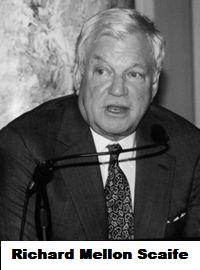 Ruddy published a follow-up book on his investigation, called The Strange Death of Vincent Foster, a book which even the right-wing nuts at American Spectator Magazine conceded sounded like it had been written by a "right-wing nut."
Ruddy published a follow-up book on his investigation, called The Strange Death of Vincent Foster, a book which even the right-wing nuts at American Spectator Magazine conceded sounded like it had been written by a "right-wing nut."
Are you starting to see a pattern here?
None of this makes Vincent Foster any less dead, of course. At the least, Foster was driven into an untenable professional position and pressured by longtime friends who ignored his spiral into depression. Which isn't a good thing.
Persistent rumors have abounded that Hillary Clinton was having an affair with Foster. It's one of the more reasonable claims made about the case, although the credibility of those rumors is somewhat lessened by the fact that the people making the charge usually follow a few minutes later with a claim that Hillary was a lesbian.
There's no rock-solid evidence of an affair except for the numerous hearsay rumors, although it's certainly not outside the realm of possibility, given what we know about the Clintons' marriage. The Fosters' marriage was troubled at the time of his death, a fact that Ken Starr left out of his report in a moment of uncharacteristic restraint.
The White House did get inappropriately political immediately following the death, but if that rose to the level of obstruction of justice, Ken Starr couldn't figure it out. According to several reports in non-Scaife media outlets, the White House rifled Foster's papers after his death, looking for potentially embarrassing material.
A Republican Senate committee found "evidence to suggest" that the White House had been involved in covering up Whitewater and/or Rose Law Firm materials in Foster's office, and that some people in the White House may have impeded the investigation of Foster's death, but none of this evidence was enough to lead to criminal charges. A Democratic response, predictably, found the Republican charges to be spurious. Given the overall context, you have to think it's quite likely there was some funny business regarding the papers.
Foster must be rolling in his grave at his status as the iconic martyr of the Clinton administration, hero to the most extreme fringes of the far right wing.
Who knows what afterlife berth Foster may have arrived in — but if he has Internet access, it's probably Hell, an eternity of ego-surfing to read statements like "Few of us knew what a decent, stable, conscientious and devoted family man Vincent Foster was" — a tribute penned by Christopher Ruddy who immediately followed with "which makes the depression theory (of his suicide) even more preposterous."
Or any of the tens of thousands of pages covering similar ground, only with even less sensitivity and even less grounding in reality:
-
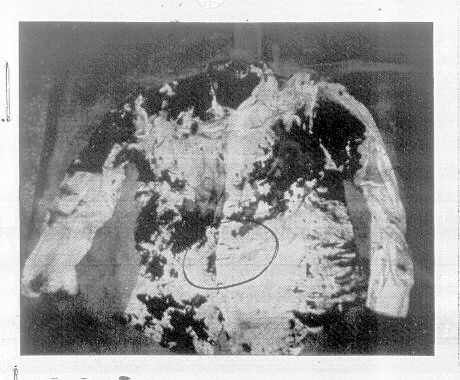 "Why was the body discovered in an ugly, desolate, mosquito-infested park?"
"Why was the body discovered in an ugly, desolate, mosquito-infested park?" - "Hillary Clinton pressured the late Vince Foster to resolve the 1993 Waco stand-off in a move that led to the deaths of more than 80 men, women and children, former White House aide Linda Tripp charged in an interview Friday night..."
-
"O.J. Simpson detective-turned-author Mark Fuhrman is trying to "solve" the mysterious suicide of deputy White House counsel Vince Foster."
-
"The man said he had some information that might be important. Something had upset Vince Foster greatly just days before he died. Some thing about 'TAINTED BLOOD' THAT BOTH VINCE FOSTER AND PRESIDENT CLINTON KNEW ABOUT..."
-
"Faced with this labyrinth, I knew that any hope of putting together a challenge-proof list of over 100 items was unrealistic. Is it possible there are errors in this catalog? Certainly. Nonetheless, I am confident 90% of these assertions will hold up with time. For any rational person, the weight of 90-plus discrepancies must still remain staggering."
-
"Since The Clinton Chronicles, the body count has multiplied: Some lists now include more than 60 'victims. The lists include the most familiar dead Clinton associates (Vince Foster, Ron Brown), but also a cast of lesser-known characters, from a Little Rock dentist to former Clinton bodyguards. Some lists include people entirely unconnected to the president, such as Abbie Hoffman and Nicole Brown Simpson."
Clinton and O.J.? Now there's a conspiracy theory you could get behind!
Timeline
| 15 Jan 1945 |
Vince Foster born, Hope, AR. |
| 1963 |
Graduates Hope High School. |
| 1967 |
Graduates Davidson College. |
| 1971 |
University of Arkansas School of Law, first in his class. |
| 1968 |
Marries Elizabeth Brader. |
| Jan 1993 |
Foster accepts a position as Deputy White House Counsel for the Clinton Administration. |
| 19 Jul 1993 |
Foster requests anti-depressant medication from his doctor, and receives a prescription for Trazadone. |
| 20 Jul 1993 |
Vince Foster attends a Rose Garden ceremony to announce Louis Freeh's appointment as FBI chief. |
| 20 Jul 1993 |
Vince Foster purportedly commits suicide with a .38 revolver, Fort Marcy Park. |
| 20 Jul 1993 |
At 7:40 pm, Dr. Haut confirms Foster's death. |
| 21 Jul 1993 |
Deputy Chief Medical Examiner Dr. James C. Beyer conducts an autopsy. |
| 26 Jul 1993 |
"Suicide note" discovered in Foster's briefcase at the White House, a briefcase which had been previously searched. |
| 10 Aug 1993 |
DOJ, FBI, and Park Police announce findings: suicide. |
| 20 Dec 1993 |
White House confirms that Whitewater documents were in Foster's office at the time of suicide, but mysteriously were disappeared. |
| 20 Jan 1994 |
Janet Reno appoints special prosecutor Robert B. Fiske, Jr. for the Whitewater affair. |
| 10 Mar 1994 |
Upon receiving an article clipped from a newsletter from Johnson Smick International, Rush Limbaugh deems it worthy to share the unsubstantiated claim with his radio listeners: "OK, folks, I think I got enough information here to tell you about the contents of this fax that I got. Brace yourselves. This fax contains information that I have just been told will appear in a newsletter to Morgan Stanley sales personnel this afternoon... What it is is a bit of news which says... there's a Washington consulting firm that has scheduled the release of a report that will appear, it will be published, that claims that Vince Foster was murdered in an apartment owned by Hillary Clinton, and the body was then taken to Fort Marcy Park." No such report is ever actually issued. |
| 30 Jun 1994 |
Fiske Report: "The overwhelming weight of the evidence compels the conclusion... that Vince Foster committed suicide in Fort Marcy Park on July 20, 1993." |
| c. 1995 |
A leaked U.S. Attorney Miquel Rodriguez tape indicates that he viewed an official photo which demonstrated a puncture wound in Foster's neck, contrary to the official story. |
| Dec 1999 |
On his television show The O'Reilly Factor, Bill O'Reilly surprises special prosecutor Ken Starr:
| O'REILLY: |
Now, some of your investigators have told us off the record that they believe Vince Foster did not commit suicide and that your office was not aggressive enough in investigating the Vince Foster situation. How do you reply? |
| STARR: |
Bill, you didn't get that from my investigators. I don't know who you got it from. |
| O'REILLY: |
I did. |
| STARR: |
Oh, I -- |
| O'REILLY: |
I did. |
| STARR: |
They -- they did not think that -- |
| O'REILLY: |
I got it from one of your investigators, I have to tell you. I would never say an untruth on this program. |
| STARR: |
All right. OK. All right. Let me just say this. |
| O'REILLY: |
Go ahead. |
| STARR: |
We looked at every aspect of that invest -- of that death, and we came unanimously -- those of us involved in it, so I will look forward to finding out who this person was. |
|
| 19 Jan 2000 |
Buffalo radio personality Tom Bauerle needles Hillary Clinton about her rumored infidelities:
| JOURNALIST: |
Mrs. Clinton, you're going to hate me, you were on television last night talking about your relationship with the President, Bill Clinton. Have you ever been sexually unfaithful to him and specifically the stories about you and Vince Foster. Any truth in those? |
| CLINTON: |
I do hate you for that, because you know, those questions I think are really out of bounds, and everybody who knows me knows the answers to those questions. |
| JOURNALIST: |
Is the answer "no"? |
| CLINTON: |
Well, yes. Of course it's "no," but it's an inappropriate question. |
|
Report on the Death of Vincent W Foster
|
 If you're interested in the death of Vince Foster, you're in luck. More has probably been written on the subject than on Watergate, the Kennedy Assassinations and the Moon Landing combined.
If you're interested in the death of Vince Foster, you're in luck. More has probably been written on the subject than on Watergate, the Kennedy Assassinations and the Moon Landing combined.  Early in 1993, the first of what would be many Clinton administration scandals broke loose — the so-called
Early in 1993, the first of what would be many Clinton administration scandals broke loose — the so-called  On July 20, 1993, Vincent Foster committed
On July 20, 1993, Vincent Foster committed  Wounds not consistent with self-inflicted gunshot.
Wounds not consistent with self-inflicted gunshot.  Well, his name is
Well, his name is  Ruddy published a follow-up book on his investigation, called The Strange Death of Vincent Foster, a book which even the right-wing nuts at American Spectator Magazine conceded sounded like it had been written by a "right-wing nut."
Ruddy published a follow-up book on his investigation, called The Strange Death of Vincent Foster, a book which even the right-wing nuts at American Spectator Magazine conceded sounded like it had been written by a "right-wing nut."  "Why was the body discovered in an ugly, desolate, mosquito-infested park?"
"Why was the body discovered in an ugly, desolate, mosquito-infested park?"